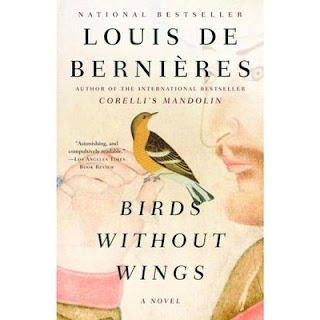It says up top that I cook. And I do. Sometimes I actually raise myself from my comfy reading chair and head into the kitchen. Like nearly every day.
I love to cook. It's creative, it's calming, it's enjoyable...and at the end you have something yummy to eat. (Usually.)
What do I like to cook? I'm a kitchen dilettante -- I like to cook all sorts of things from all over the culinary map. The only constant is I like big flavors with lots of spice. Nothing frilly or delicate, nothing fancy. Just strong, bold tastes. I make great pork banh mi. Delicious pho. Excellent chili. Terrific murg tikka masala. In the winter, I love one-pot meals like chili and short ribs. In the summer, I specialize in grilled fish and interesting salads. And I must live in a locale with changing seasons, because there is nothing better than the first spring asparagus, the first summer berries, the first butternut squash of fall. I'm not a loco locavore, but I try (it can get pretty despairing during a New York winter if you like vegetables).
As much as I love books, I don't generally use cookbooks and own just a few, my long-term favorite being the original Silver Palate cookbook by Julee Rosso and Sheila Lukins, published waaaaay back in 1982. That book was a revelation to me, and I wore its pages out -- literally. I had a replace it somewhere around 2000. Cookbook author Barbara Kafka said, "This was the book that changed the way America cooks." That might be hyperbole, but it was surely the book that changed the way I cooked. That garlicky aioli, the buttery bearnaise sauce, the decadent chocolate cake...I'd never heard of things like this, but it was love at first bite. I still make the black bean soup, the pecan bars, the warm lentil salad, and they are all still wonderful.
I have a few other much-loved and much-stained cookbooks: Tom Valenti's Soups, Stews, and One-Pot Meals; Claudia Roden's ancient Book of Middle-Eastern Food; the just-out Smitten Kitchen (those peach pancakes! if you like to cook and you don't follow the Smitten Kitchen blog, start); a really old Fannie Farmer Cookbook and an equally old Joy of Cooking (where else can you find the recipe for tartar sauce? or find out how to skin a squirrel (other than watching Winter's Bone?); and a few others.
But my current favorite is one given me by my friend Michael from Melbourne: Ottolenghi: The Cookbook. In case you don't recognize the name (Ottolenghi, not Michael), Yotam Ottolenghi is the brilliant Israeli (of Italian-German descent) chef, owner of four London restaurants, weekly Guardian columnist (check out his column here), and co-author (with his partner Sami Tamini, an Israeli of Palestinian heritage) of three cookbooks. including the just-out and very well received Jerusalem.
The recipes in Ottolenghi are in British, meaning you have to translate from grams and milliliters to ounces and cups, which is a pain. And you have to figure out what mangetout and sultanas and caster sugar are (snow peas and golden raisins and superfine sugar, respectively). But judging by the recipes I've made, it's worth these minor annoyances -- and I'm not much of a measurer anyway (except for baking), so I just approximate anyway.
The other caveat is that there are many ingredients
that may be hard to find, especially for cooks living outside well-stocked
major metropolitan areas: preserved lemons, orange blossom water, sumac,
rosewater. But thanks to the magic of the Internet (or some smart
substitutions), pretty much anything can be located, delivered, or worked
around.
I made this incredibly delicious dish for a
recent gathering and liked it so much I've made it twice more in the last
couple of weeks. It's so yummy that I caught people -- grown-up, well-mannered
people -- licking the little bits of sauce off the platter with their fingers.
There's no greater compliment.
I also tried this dish because I'd never used
Jerusalem artichokes before. In fact, I wasn't exactly sure what Jerusalem
artichokes were. Isn't learning new things fun? I've discovered the most
delicious, easy-to-use vegetable! These ugly, knobby little balls look like
something Shrek would have for breakfast. But they cook up like a dream, fluffy
and starchy like potatoes but with that lingering, sweet-ish taste of
artichokes. Interestingly, the name is a misnomer. Jerusalem artichokes have
nothing to do with Jerusalem and are not related to artichokes. They're the
root of a type of sunflower, also called sunchoke or sunroot, native to
America. They got the artichoke part of their name from the taste. As for the
Jerusalem, some believe it's because Italian immigrants to America called the
plant "girasole," the Italian word for sunflower. Somewhere
along the way, girasole became Jerusalem. Having fun yet? You will be,
once you try this oh-so-delicious side dish. And I've even done the conversions
for you.
Roast potatoes and Jerusalem artichokes with lemon and sage
From Ottolenghi: The Cookbook, Yotam Ottolenghi and Sami Tamini
Serves 4-6
Measurements are approximate because I'm translating from metric
About a pound of small potatoes (I used fingerlings)
About a pound of Jerusalem artichokes
4 garlic cloves, crushed (please crush rather than mince, so the taste can spread and adhere)
1/4 cup olive oil
2 TBS roughly chopped sage
1 tsp salt
1/2 tsp black pepper
About half a pound of cherry tomatoes
About 6 ounces Kalamata olives, pitted (I didn't use these and it was fine without them)
2 TBS roughly chopped flat-leaf parsley
1. Preheat the oven to 375. Wash the potatoes well, put them in a large saucepan and cover with salted water. Bring to a boil, then simmer for 20 minutes, until semi-cooked. Obviously, this will take less time the smaller your potatoes, so check. Drain, cool slightly, then cut in half lengthwise. Put into a large roasting tray.
2. Wash the Jerusalem artichokes, cut into slices about 1/4" thick and add to the potatoes. Add the garlic, olive oil, sage, salt, and pepper. Mix everything well with your hands and put in the oven.
3. Meanwhile, thinly slice the lemon and remove the pits. After the vegetables have been roasting for about 30 minutes, add the sliced lemon, stir with a wooden spoon and return to the oven for 20 minutes. Then add the cherry tomatoes and olives (if using), stir well again and cook for a further 15 minutes.
4. Remove from the oven and stir in some of the chopped parsley. Transfer to a serving dish and garnish with the remaining parsley. Then lick the plate.







